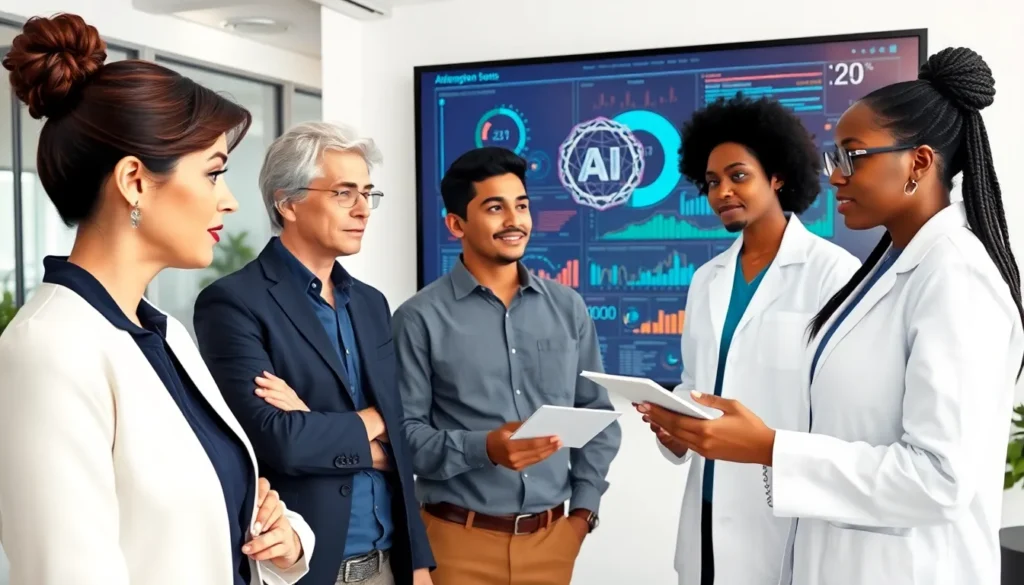Table of Contents
ToggleArtificial Intelligence isn’t just a buzzword anymore; it’s the engine driving innovation across industries. From chatbots that can hold a conversation better than your in-laws to algorithms predicting your next Netflix binge, AI is reshaping how we live and work. It’s like having a super-smart assistant who never asks for a raise or takes coffee breaks.
As advancements in AI continue to accelerate, they’re not just changing the game; they’re rewriting the rulebook. Imagine a world where machines learn faster than humans and help solve problems we didn’t even know we had. Buckle up, because the future is here, and it’s powered by AI. Whether you’re a tech enthusiast or just curious about what’s next, this journey through AI’s latest breakthroughs promises to be both enlightening and entertaining.
Overview of AI Advancements
Artificial Intelligence has transformed numerous industries, leading to remarkable advancements in technology. Significant growth in machine learning techniques has occurred, enabling AI systems to learn from vast datasets. Natural language processing models have enhanced communication by allowing machines to understand and generate human language with greater accuracy.
Robotics also benefits from AI improvements. Advanced algorithms power autonomous systems, allowing robots to perform complex tasks in manufacturing, healthcare, and logistics. These developments increase efficiency, reduce errors, and lower operational costs.
AI’s impact reaches beyond traditional industries. Businesses leverage AI-driven analytics for data interpretation and decision-making. Predictive analytics models provide insights to anticipate market trends, giving organizations a competitive edge.
Healthcare innovations showcase AI advancements as well. AI technologies assist in patient diagnosis, treatment planning, and personalized medicine. Machine learning algorithms analyze medical images, identifying conditions faster than human radiologists in some cases.
Moreover, AI is reshaping the customer experience. Chatbots and virtual assistants provide 24/7 customer support, improving satisfaction rates. Personalization algorithms tailor recommendations, enhancing engagement and driving sales for online retailers.
Education also benefits from AI integration. Adaptive learning platforms create customized learning experiences for students, addressing individual needs effectively. Educators use AI tools to automate administrative tasks, freeing up time to focus on student interaction.
Financial services see AI adoption for risk assessment and fraud detection. Machine learning models analyze transaction data in real-time, identifying suspicious activity swiftly. This advancement enhances security and maintains consumer trust in digital transactions.
Collectively, these innovations illustrate AI’s significant role in modern society. Each advancement contributes to improved efficiency, productivity, and quality of life across multiple sectors.
Key Innovations in AI

AI technology continues to thrive, showcasing a variety of groundbreaking advancements across multiple domains. Significant developments in machine learning and natural language processing are particularly noteworthy.
Machine Learning Breakthroughs
Recent breakthroughs in machine learning enhance predictive capabilities and automate various tasks. Algorithms now analyze large datasets more efficiently, allowing businesses to make data-driven decisions. Techniques like reinforcement learning enable systems to improve performance through experience. Real-time processing of complex data simultaneously empowers applications in sectors such as finance and healthcare. Innovative frameworks, such as TensorFlow and PyTorch, support faster model training. As a result, organizations experience increased accuracy and reduced operational costs, solidifying machine learning’s essential role in AI advancements.
Natural Language Processing Enhancements
Natural language processing advancements transform how machines interpret human communication. New models, like OpenAI’s GPT-3, demonstrate improved language understanding and generation capabilities. These models enable chatbots and virtual assistants to engage in more human-like conversations. Tokenization and sentiment analysis techniques enhance the extraction of nuanced meaning from text. Significant strides in translation accuracy allow for effective communication across language barriers. Consequently, businesses benefit from enhanced customer interactions and personalized experiences, showcasing the profound impact of natural language processing innovations.
Applications of AI Advancements
Artificial Intelligence (AI) continues to reshape industries, bringing innovations that enhance efficiency and accuracy. Various applications emerge across sectors, creating opportunities for progress in everyday tasks.
Healthcare Innovations
AI technologies revolutionize healthcare by enabling precise diagnostics and personalized treatment plans. Machine learning algorithms analyze medical images rapidly, often surpassing human radiologists in speed and accuracy. Predictive analytics identify patient risks early, allowing for timely interventions. Virtual health assistants streamline appointment scheduling and patient queries, improving overall service efficiency. Innovations like AI-driven drug discovery accelerate the development of new therapies, ultimately enhancing patient care. AI tools also assist in monitoring chronic conditions, leading to better health outcomes and informed patient decisions.
Autonomous Vehicles
AI advancements drive the development of autonomous vehicles, fundamentally changing transportation. Sensors gather real-time data, while AI algorithms analyze that data to navigate roads safely. Companies like Waymo and Tesla leverage AI for obstacle detection and route optimization, enhancing driving safety and efficiency. As autonomous vehicles become more prevalent, they promise to reduce traffic congestion by optimizing driving patterns. Ride-sharing services integrate AI to match passengers with drivers effectively, improving convenience and reducing wait times. The future of transportation relies heavily on AI’s capabilities, influencing how society approaches mobility.
Challenges and Ethical Considerations
AI advancements present significant challenges and raise essential ethical considerations. Data privacy is a primary concern, as AI systems often rely on vast amounts of personal information. Individuals risk exposure if organizations do not implement proper data protection measures.
Biases embedded in AI algorithms also pose serious threats. When training data reflects societal inequalities, AI can perpetuate stereotypes, resulting in unfair treatment across various applications. Addressing this bias requires continuous monitoring and refinement of AI systems to ensure fairness.
Accountability becomes critical in AI deployment. If an AI system causes harm, determining responsibility remains complex. Developers and companies may face legal implications, necessitating clear guidelines for accountability and transparency.
Job displacement presents another challenge, particularly in sectors where automation replaces human labor. As AI enhances efficiency and reduces operational costs, concerns about unemployment and workforce adaptation linger. Emphasizing retraining programs can help mitigate these effects.
Moreover, the potential misuse of AI technologies raises ethical dilemmas. From deepfakes to surveillance, malicious applications can harm individuals and threaten societal stability. Establishing regulations and ethical frameworks can guide responsible AI usage.
Collaboration between stakeholders enhances the development of ethical standards. Policymakers, industry leaders, and researchers must engage in open dialogues to foster a responsible AI ecosystem. Building trust among users is vital for enhancing AI’s acceptance and successful integration into everyday life.
Awareness of these challenges not only promotes informed discussions but also encourages proactive measures to address ethical concerns. Focusing on transparency, fairness, and responsibility will guide the evolution of AI technologies while ensuring they serve the greater good.
Future Trends in AI Advancements
Transformative changes in AI promise to shape industries further. Enhanced machine learning algorithms make significant strides in areas like predictive analytics and automation, streamlining operations across sectors. Continuous improvements in natural language processing allow machines to better understand and generate human language, improving user interactions.
Autonomous systems are advancing quickly. Companies are investing heavily in self-driving technologies, aiming to reduce accidents and improve traffic flow. Electric vehicles outfitted with AI will likely dominate the automotive landscape, reshaping personal and public transportation.
Healthcare will experience profound innovations spurred by AI. Enhanced diagnostic tools provide rapid analysis of medical images, increasing accuracy in identifying conditions. Virtual health assistants streamline patient communication, offering timely guidance and support while minimizing wait times.
AI’s role in cybersecurity is expanding. Enhanced algorithms help detect anomalies in real-time, significantly reducing the risk of security breaches. These advancements create a proactive approach to safeguarding sensitive information across industries.
Education is also evolving due to AI advancements. Intelligent tutoring systems offer personalized learning experiences, adapting to individual student needs. This customization aims to improve engagement and academic performance.
Ethical AI development is crucial as the technology evolves. Stakeholders emphasize the importance of transparency and accountability to build trust. Collaboration among researchers, policymakers, and industry leaders fosters the development of ethical standards, ensuring that AI technologies benefit society as a whole.
The future of AI reveals a landscape rich with potential. Innovations in automation, healthcare, and security, enable businesses to operate more effectively while enhancing the overall quality of life.
AI advancements are reshaping the landscape of various industries and enhancing everyday life. As technology continues to evolve, its applications will only expand further, driving innovation and efficiency. The integration of AI into sectors like healthcare, transportation, and education signifies a promising future where machines can better understand and interact with humans.
Despite the potential benefits, ethical considerations remain crucial. Addressing issues like data privacy, algorithmic bias, and job displacement will be vital in fostering a responsible AI ecosystem. As stakeholders collaborate to establish ethical standards, the focus on transparency and accountability will help ensure that AI technologies contribute positively to society.
The journey of AI is just beginning, and its transformative potential offers exciting opportunities. Embracing these advancements while remaining vigilant about their implications will be key to navigating this dynamic field.







